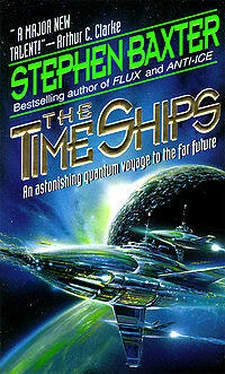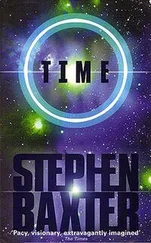Stephen Baxter - The Time Ships
Здесь есть возможность читать онлайн «Stephen Baxter - The Time Ships» — ознакомительный отрывок электронной книги совершенно бесплатно, а после прочтения отрывка купить полную версию. В некоторых случаях можно слушать аудио, скачать через торрент в формате fb2 и присутствует краткое содержание. Год выпуска: 1995, ISBN: 1995, Издательство: HarperCollins, Жанр: Фантастика и фэнтези, на английском языке. Описание произведения, (предисловие) а так же отзывы посетителей доступны на портале библиотеки ЛибКат.
- Название:The Time Ships
- Автор:
- Издательство:HarperCollins
- Жанр:
- Год:1995
- ISBN:0-002-24609-0
- Рейтинг книги:5 / 5. Голосов: 1
-
Избранное:Добавить в избранное
- Отзывы:
-
Ваша оценка:
- 100
- 1
- 2
- 3
- 4
- 5
The Time Ships: краткое содержание, описание и аннотация
Предлагаем к чтению аннотацию, описание, краткое содержание или предисловие (зависит от того, что написал сам автор книги «The Time Ships»). Если вы не нашли необходимую информацию о книге — напишите в комментариях, мы постараемся отыскать её.
by H. G. Wells, it was officially authorized by the Wells estate to mark the centenary of the original’s publication.
Won:
British SF Association Award in 1995
John W. Campbell Memorial Award for Best SF Novel in 1996
Philip K. Dick Award in 1996
Nominated for:
Hugo Award for Best Novel in 1996
Locus Award for Best SF Novel in 1996
Arthur C. Clarke Award in 1996
The Time Ships — читать онлайн ознакомительный отрывок
Ниже представлен текст книги, разбитый по страницам. Система сохранения места последней прочитанной страницы, позволяет с удобством читать онлайн бесплатно книгу «The Time Ships», без необходимости каждый раз заново искать на чём Вы остановились. Поставьте закладку, и сможете в любой момент перейти на страницу, на которой закончили чтение.
Интервал:
Закладка:
I remembered Gödel, and his dreams of the Final World. “I don’t know how far it can go,” I said truthfully. “I can’t even imagine it.”
Her face was huge before me, her eyes wells of darkness in the deepening twilight. “Then,” she said, “you must travel on and find out. Mustn’t you?” She moved closer, and I felt my hand tighten around hers, and her breath was warm against my cheek.
I sensed a stiffness about her — a reticence, which she seemed determined to overcome, if only by force of will. I touched her arm, and I found scarred flesh, and she shuddered, as if my fingers were made of ice. But then she clasped her hand around mine and held it against her arm. “You must forgive me,” she said. “It is not easy for me to be close.”
“Why? Because of the responsibilities of your command?”
“No,” she said, and her tone made me feel foolish and clumsy. “Because of the War. Do you see? Because of all of those who are gone… It’s hard to sleep, sometimes. You suffer now, not then — and that’s the tragedy of the thing, for those who survive. You feel you can’t forget — and that it’s wrong of you to go on living, even. If you break faith with us who died/ We shall not sleep, though poppies grow/ In Flanders field…”
I pulled her closer, and she softened against me, a fragile, wounded creature.
At the last moment, I whispered: “Why, Hilary? Why now?”
“Genetic diversity,” she said, her breath growing shallow.
“Genetic diversity…”
And soon we traveled on — not to the ends of time — but to the limits of our Humanity, there beside the shore of that primeval Sea.
When I awoke it was still dark, and Hilary had gone.
I came to our old encampment in full daylight. Nebogipfel barely glanced at me through his slit-mask as I entered; evidently he was as unsurprised by my decision as Hilary had been.
His Time-Car was completed. It was a box about five feet square, and around it I saw fragments of an unfamiliar metal: bits, I presumed, of the Messerschmitt, salvaged by the Morlock. There was a bench, lashed up from the wood of the dipterocarps, and a small control panel — a crude thing of switches and buttons — that featured the blue toggle switch which Nebogipfel had salvaged from our first Time-Car.
“I have some clothes for you,” Nebogipfel said. He held up boots, a twill shirt, and trousers, all in reasonable order. “I doubt our colonists will miss them now.”
“Thank you.” I had been wearing shorts made of animal skin; I dressed rapidly.
“Where do you want to go?”
I shrugged. “Home. 1891.”
He distorted his face. “It is lost in the Multiplicity.”
“I know.” I climbed into the frame. “Let us travel forward anyway, and see what we find.”
I glanced, one last time, at the Palaeocene Sea. I thought of Stubbins, and the tame Diatryma, and the light off the Sea in the morning. I knew that I had come close to happiness here — to a contentment that had eluded me all my life. But Hilary was right: it was not enough.
I still felt that great desire for home; it was a call in me along the River of Time, as strong, I thought, as the instinct which returns a salmon to its breeding-ground. But I knew, as Nebogipfel had said, that my 1891, that cozy world of Richmond Hill, was lost in the fractured Multiplicity.
Well: if I could not go home, I decided, I would go on: I would follow this road of Changing, until it could take me no further!
Nebogipfel looked at me. “Are you ready?”
I thought of Hilary. But I am not a man to be doing with goodbyes.
“I’m ready.”
Nebogipfel climbed stiffly into the frame, favoring his badly set leg. Without ceremony, he reached for his panel of controls and closed the blue toggle.
[19]
Lights In the Sky
I caught one last glimpse of two people — a man and a woman, both naked — who seemed to hurtle across the beach. A shadow fell briefly over the car, perhaps cast by one of the immense animals of this Age; but soon we were moving too rapidly for such details to be discernible, and we fell into the colorless tumult of time travel.
The heavy Palaeocene sun leapt across the Sea, and I imagined how from the point of view of our transition through time the earth spun like a top on its axis, and rocketed around its star. The moon, too, was visible as a hurtling disc, rendered shadowy by the flickering of its phases. Soon the sun’s daily passage merged into the band of silver light which dipped between equinoctial limits, and day and night melted into the uniform blue-gray glow I have described before.
The dipterocarps trees of the forest shivered with growth and death, and were shouldered aside by the vigorous growth of younger plants; but the scene around us — the forest, the Sea smoothed by our time-passage to a glassy plain — remained static in its essentials, and I wondered if, despite all my and Nebogipfel’s efforts, men had after all failed to survive, here in the Palaeocene.
Then — quite without warning — the forest withered and vanished. It was as if a blanket of greenery had been ripped back from the soil. But the land was scarcely left bare; as soon as the forest was cleared, a melange of blocky brown and gray — the buildings of an expanding First London — swept over the earth. The buildings flowed over the denuded hills and down, past us, to the Sea, there to sprout into docks and harbors. The individual constructions shivered and expired, almost too fast for us to follow, though one or two persisted long enough — I suppose for several centuries — to become almost opaque, like crude sketches. The Sea lost its blue tinge and mutated into a sheet of dirty gray, its waves and tides made into a blur by our passage; the air seemed to take on a brown tinge, like an 1890s London fog, which gave the scene something of a dirty, twilit glow, and the air about us felt warmer.
It was striking that as the centuries fell away, regardless of the fate of individual buildings, the general outlines of the city persisted. I could see how the ribbon of the central river — the proto-Thames — and the scars of major road routes remained, in their essentials, unchanged by time; it was a striking demonstration of how geomorphology, the shape of the landscape, dominates human geography.
“Evidently our colonists have survived,” I said to Nebogipfel. “They have become a race of New Humans, and they are changing their world.”
“Yes.” He adjusted his skin slit-mask. “But remember we are traveling at several centuries per second; we are in the midst of a city which has already persisted for some thousands of years. I doubt that little is left of the First London we saw established.”
I peered around, my curiosity strong. Already my little band of exiles must be as remote to these New Humans as had been the Sumerians, say, from 1891. Had any memory persisted, in all this wide and bustling civilization, of the fragile origins of the human species in this antique era?
I became aware of a change in the sky: an odd, green-tinged flickering about the light. I soon realized it was the moon, which still sailed around the earth, waxing and waning through its ancient cycle too fast for me to follow — but the face of that patient companion was now stained green and blue — the colors of earth, and life.
An inhabited, earthlike moon! This New Humanity had evidently traveled to the sister world in Space Machines, and transformed it, and colonized it. Perhaps they had developed into a race of moon-men, as tall and spindly as the low-gravity Morlocks I had encountered in the Year 657,208! Of course I could not make out any detail, as the moon’s month-long orbit took it spinning across my accelerated sky; and of that I was regretful, for I would have loved to have had a telescope and to make out the waters of new oceans lapping those deep, ancient craters, and the forests spreading across the dust of the great maria. How would it be to stand on those rocky plains — to be cut loose of Mother Earth’s leading-strings? With every step in that reduced gravity one would fly through the thin, cold air, with the sun fierce and motionless overhead; it would be like the landscape of a dream, I thought, with all that glare, and plants less like earthly flora than the things I imagined among the rocks at the bottom of the sea…
Читать дальшеИнтервал:
Закладка:
Похожие книги на «The Time Ships»
Представляем Вашему вниманию похожие книги на «The Time Ships» списком для выбора. Мы отобрали схожую по названию и смыслу литературу в надежде предоставить читателям больше вариантов отыскать новые, интересные, ещё непрочитанные произведения.
Обсуждение, отзывы о книге «The Time Ships» и просто собственные мнения читателей. Оставьте ваши комментарии, напишите, что Вы думаете о произведении, его смысле или главных героях. Укажите что конкретно понравилось, а что нет, и почему Вы так считаете.









